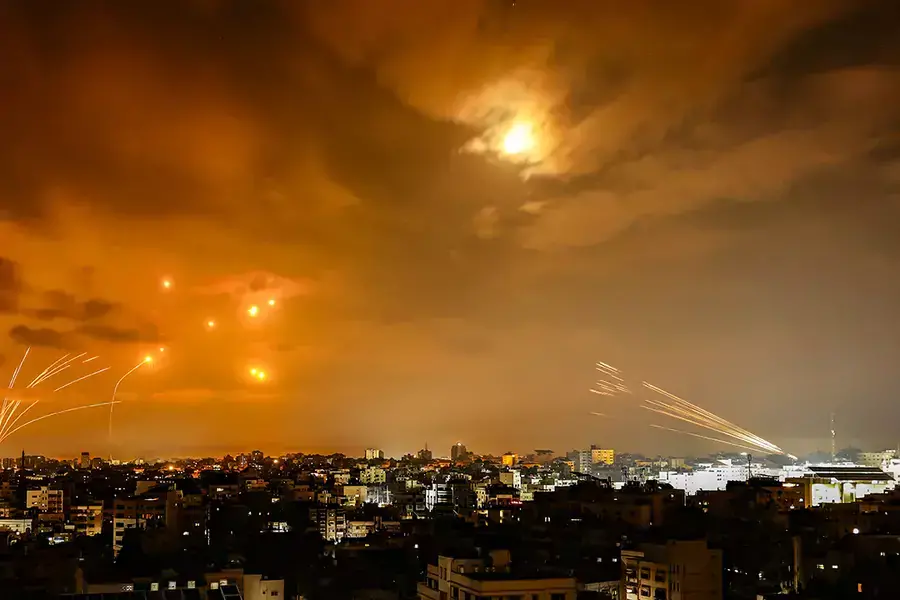The President’s Inbox Recap: The Israel-Hamas War

The latest episode of The President’s Inbox is live! This week, Jim sat down with Elliott Abrams, senior fellow for Middle Eastern studies at CFR, and Steven Cook, Eni Enrico Mattei senior fellow for Middle East and Africa studies at CFR. They discussed the surprise attack by Hamas—the Palestinian militant group that governs Gaza—against Israel and the resulting Israeli response.
The Israel-Hamas War, With Elliott Abrams and Steven Cook
Elliott Abrams, a senior fellow for Middle Eastern studies at CFR, and Steven Cook, the Eni Enrico Mattei senior fellow for Middle East and Africa studies at CFR, sit down with James M. Lindsay to discuss the context and consequences of Hamas’s surprise attack on Israel.
Here are four highlights from their conversation:
1.) Hamas’s surprise attack resulted in the single deadliest day in Israel’s history. The attack from land, sea, and air has killed more than 1,300 Israelis and at least fourteen Americans. “Hamas attacked Israeli towns,” Steven said. “They've attacked Tel Aviv. They've attacked Ashkelon. They mercilessly murdered Israeli civilians.” Hamas—which the United States has designated as a terrorist organization—also took dozens of civilians hostage. They are now being held in Gaza. Israel has responded by declaring war on Hamas and ordering a “complete siege” of Gaza. Israel has bombarded the Gaza Strip, killing at least 900 Palestinians. Steven acknowledged that “the unfortunate damage is going to be mostly to the Palestinian population of the Gaza Strip that has nothing whatsoever to do with this.”
More on:
2.) The attack was unprecedented in its scale, raising questions about Hamas’s strategic goal. In the eighteen years since Israel withdrew its forces from Gaza, Hamas has periodically launched rocket attacks and conducted terrorist operations against Israel. Israel in turned has launched reprisal attacks, sometimes referred to a “mowing the grass,” to punish Hamas and reestablish deterrence. Last weekend’s attack, however, far exceeded any previous Hamas operation against Israel. As Steven noted, “This attack was really a quantum leap in changes in the way in which Hamas operates and its tactics in terms of attacking Israel, so it had to have been planning for quite some time.” With a massive Israeli retaliation guaranteed, the question arises as to what Hamas was seeking to accomplish. Elliott discounted suggestions that the attack was intended to disrupt a possible rapprochement between Israel and Saudi Arabia, noting that planning for the attack began long before that diplomatic effort gathered steam. He argued that “attacking Israel” was the goal. Steven largely agreed, saying that Hamas was motivated by “resistance for the sake of resistance, whether it's in this kind of nihilistic way or not, burnishes them, makes them an important actor, [and] demonstrates how important they are.”
3.) Israelis are asking why the attack caught them by surprise. Intelligence agencies are not immune to intelligence disasters. Elliott pointed to two factors that might have been at play. One is that Israeli intelligence relies on “high-tech stuff” to detect threats, while Hamas turned to old-fashioned means of communication like “a piece of paper and messengers” that sophisticated intelligence systems miss. The bigger factor, though, may have been a failure to believe that such an attack was possible. Elliott put it this way: “If you believe it's inconceivable that Hamas would come across the border in large numbers” then you wouldn’t “connect the dots” on an attack.
4.) The attack raises concern of a broader war in the Middle East. A major question is whether Hezbollah might open a second front in the fighting by attacking Israel from the north, or if unrest might erupt in the West Bank. Then there is the question of whether Israel might retaliate against Iran, a long-time supporter of Hamas. The Wall Street Journal reported that Iran’s Islamic Revolutionary Guard Corps greenlit the invasion, though U.S. and Israeli officials maintain they are uncertain of Iran’s involvement. The U.S. Joint Chiefs of Staff has cautioned Iran against joining the war.
If you’re looking for more of CFR’s analysis of Hamas’s attack and Israel’s response, Elliott argued that the attack changes the dynamic between Israel and Hamas in Gaza. Steven wrote an In-Brief that explained how the attack could trigger a wider Mideast War as well as an article that analyzes what are likely to be Israel’s next steps. Martin Indyk broke down why Hamas attacked Israel and why the Israeli government was caught by surprise.
The Center for Preventive Action’s Global Conflict Tracker on the Israeli-Palestinian Conflict is also worth a read.
More on:
 Online Store
Online Store